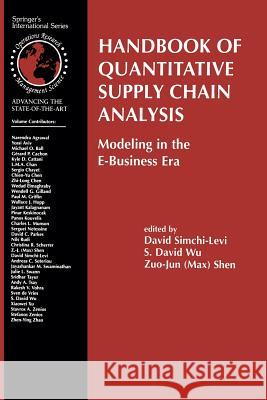Handbook of Quantitative Supply Chain Analysis: Modeling in the E-Business Era » książka
Handbook of Quantitative Supply Chain Analysis: Modeling in the E-Business Era
ISBN-13: 9781475710748 / Angielski / Miękka / 2013 / 818 str.
Over the past two decades, not only has supply chain analysis become a strategic focus of leading firms, it has also spawned an impressive array of research that brings together diverse research communities. Adding to this diversity and intellectual energy is the emergence of E-Business. E-Business creates new competitive dimensions that are fast-paced, ever-changing, and risk-prone, dimensions where innovation, speed, and technological savvy often define success. Most importantly, E-Business challenges the premises and expands the scope of supply chain analysis. The Handbook is a comprehensive research reference that is essential for anyone interested in conducting research in supply chain. Unique features include: -A focus on the intersection of quantitative supply chain analysis and E-Business,
-Unlike other edited volumes in the supply chain area, this is a handbook rather than a collection of research papers. Each chapter was written by one or more leading researchers in the area. These authors were invited on the basis of their scholarly expertise and unique insights in a particular sub-area,
-As much attention is given to looking back as to looking forward. Most chapters discuss at length future research needs and research directions from both theoretical and practical perspectives,
-Most chapters describe in detail the quantitative models used for analysis and the theoretical underpinnings; many examples and case studies are provided to demonstrate how the models and the theoretical insights are relevant to real situations,
-Coverage of most state-of-the-art business practices in supply chain management. Audience: This volume is suitable for researchers, faculty, graduate students, and practitioners in the following areas: supply chain management, operations research, management science, decision science, industrial engineering, operations management, civil engineering/transportation, logistics management, risk management, applied mathematics, economics, computer science, industrial management, and other related areas.











